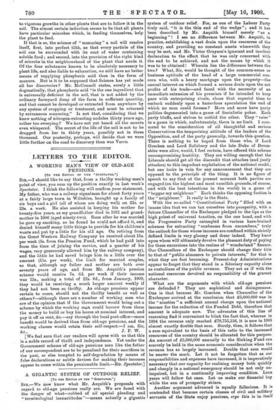LETTERS TO THE EDITOR.
A WORKING MAN'S VIEW OF OLD-AGE PENSIONS.
(TO THE EDITOIt or Ills " Sr teCrATOF{."f Sia,—I should like to say that, from a thrifty working man's point of view, you sum up the position exactly in last week's Spectator. I think the following will confirm your statement. My father, who was a railway signalman for about forty years at a fairly large town in Wiltshire, brought up a family of six boys and a girl (all of whom are doing well) on 22s. or 23s. a week. He also assisted in keeping his mother for twenty-five years, as my grandfather died in 1881 and grand- mother in 1906 (aged ninety-two). Soon after he was married he gave up smoking, as he found he could not afford it, and denied himself many little things to provide for his children's wants and put by a little for his old age. On retiring from the Great Western Railway Company he received about lls. per week (5s. from the Pension Fund, which be had paid into from the time of joining the service, and a quarter of his wages, very generously allowed him by the railway company), and the little he had saved brings him in a little over the amount (15s. per week), the limit for married couples, so that, although my father and mother are both over seventy years of age, and from Mr. Asquith's pension scheme would receive 7s. 6d. per week if their income was 15s., making a total of 22s. 6d., from January, 1909, they would be receiving a much larger amount weekly if they had not been so thrifty. As old-ago pensions appear certain to come, should not the thrifty benefit as well as others ?—although there are a number of working men who are of the opinion that if the Government would bring out a scheme by which the working twat could borrow from them the money to build or buy his house at nominal interest, and pay it off as rent, &c.—say through the local post-office—more benefit would be derived than from old-age pensions, and the working classes would retain their self-respect.—I am, Sir,
[We feel sure that our readers will agree with us that this is a noble record of thrift and independence. Yet under the Government scheme of old-age pensions men like the father of our correspondent are to be penalised for their sacrifices in the past, or else tempted to self-degradation by means of false declarations or subtle devices for making their incomes appear to come within the pensionable limit.—En. Spectator.]














































 Previous page
Previous page